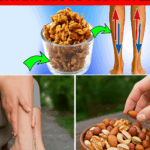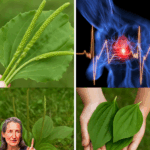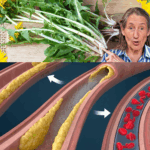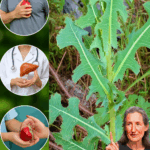Have you ever paused to admire a striking plant with trumpet-shaped flowers and spiky pods gracing a roadside or garden corner? That beauty might be Datura stramonium, a wild plant that lures with its charm but hides a sinister secret. For seniors who cherish gardening or foraging, this plant’s allure can be deceptive, promising natural remedies yet delivering dangerous toxins. Every part—leaves, flowers, seeds, and roots—poses a severe risk, especially to older adults with fragile health. Curious about why this plant is a hidden hazard? Let’s uncover its dangers and arm you with the knowledge to stay safe, keeping you engaged with every precaution.

The Deceptive Charm of Datura Stramonium
🌸 Datura stramonium, often sprouting along U.S. roadsides, pastures, or neglected gardens, captivates with its large white or purple trumpet flowers and spiky seed pods. To seniors who love tending yards or exploring nature, it might seem like a delightful addition or a folk remedy. Yet, its beauty masks a dark truth: it’s a member of the nightshade family, kin to both tomatoes and deadly nightshade. This plant is among North America’s most toxic, with even a small exposure threatening serious health issues—particularly for those over 50 with existing conditions.
The Toxic Heart of Datura Stramonium
Datura’s danger lies in its tropane alkaloids—atropine, scopolamine, and hyoscyamine—which wreak havoc by blocking acetylcholine, a vital neurotransmitter for brain and muscle function. These compounds can trigger a cascade of effects, from mild distress to life-threatening crises. For seniors, already navigating medications for heart or other ailments, this toxicity amplifies risks. Even a few seeds or a leaf nibble can unleash chaos, with potency varying unpredictably by season and growth conditions, making safe use impossible.
Recognizing the Warning Signs
⏰ Symptoms of Datura poisoning emerge within 30 to 60 minutes and can linger for up to 48 hours, a critical concern for seniors outdoors. Watch for:
- Dry mouth and intense thirst from reduced saliva.
- Dilated pupils and blurred vision, heightening light sensitivity.
- Rapid heartbeat, risking complications in older hearts.
- Hallucinations and delirium, causing confusion or aggression.
- Seizures or coma in severe cases, posing life threats.
Seniors might confuse these with dehydration or medication side effects, delaying help. If you or a loved one shows these signs after plant contact, seek emergency care immediately—time is your ally.
Where Seniors Might Encounter This Plant
🌿 Datura stramonium lurks in familiar spots:
- Gardening Mishaps: It blends into flower beds or veggie patches, mistaken for a weed.
- Foraging Fumbles: Its folk remedy allure might trick those seeking natural cures.
- Accidental Touch: Brushing against it or handling seeds can absorb toxins via skin or mucous membranes.
- Pet or Grandchild Risk: Curious pets or kids might ingest it, endangering the household.
A case of a 3-year-old poisoned by its seeds highlights its threat to vulnerable groups, a warning seniors with slower metabolisms should heed.
Stay Safe with Practical Steps
🌱 Enjoy nature safely with these five tips:
- Learn its look—trumpet flowers, spiky pods, jagged leaves—and use a plant app or local expert to confirm.
- Wear gloves and long sleeves while gardening to shield your skin.
- Supervise pets and grandchildren near wild plants.
- Skip foraging unless you’re a botany pro; rely on store-bought herbs.
- Remove it safely with gloves and tools, bagging it—never burn it, as smoke carries toxins.
Share your gardening wisdom below to keep your community safe!

Act Fast if Poisoning Occurs
🚑 Suspected exposure demands swift action:
- Call 911 or Poison Control (1-800-222-1222) with plant and symptom details.
- Avoid inducing vomiting, which can worsen risks, especially for seniors.
- Get to a doctor for treatments like activated charcoal or physostigmine if needed.
- Bring a gloved-collected plant sample for identification if possible.
Early intervention can turn the tide, with thousands treated annually avoiding severe outcomes.
Thrive in Nature as a Senior
🌼 Gardening and nature bring joy, reducing stress and boosting activity for seniors. Understanding Datura’s dangers lets you enjoy these safely. Plant non-toxic beauties like marigolds or lavender, and tap local gardening clubs for region-specific advice. Curiosity about nature enriches life after 50—stay cautious and share this wisdom with loved ones. Explore more health tips on our site to keep your passions flourishing!
Disclaimer: This content is for informational purposes only and is not a substitute for professional medical advice. Consult your healthcare provider before making health changes.









